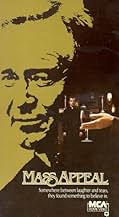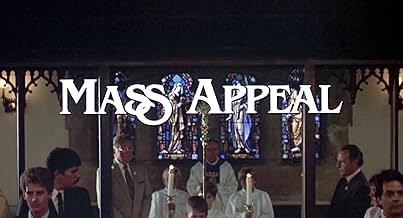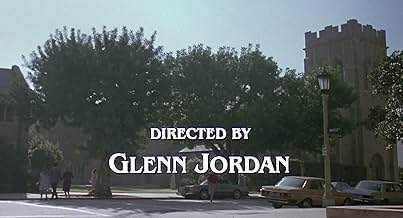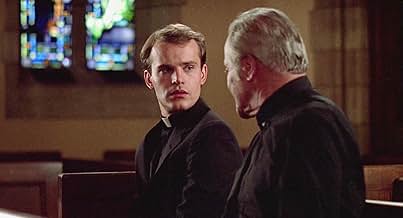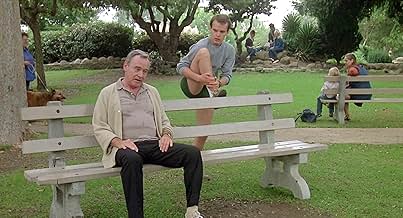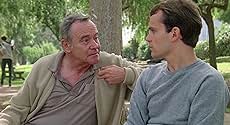IMDb रेटिंग
6.7/10
1.2 हज़ार
आपकी रेटिंग
अपनी भाषा में प्लॉट जोड़ेंA popular Connecticut priest shields a seminary rebel from the wrath of a stern monsignor.A popular Connecticut priest shields a seminary rebel from the wrath of a stern monsignor.A popular Connecticut priest shields a seminary rebel from the wrath of a stern monsignor.
- पुरस्कार
- कुल 1 जीत
फ़ीचर्ड समीक्षाएं
"Mass Appeal" is enjoyable on several levels. It works as an examination of the depth of contemporary religious beliefs and their current role in our society, as an indictment of an inflexible system (the Catholic church), and as a comment on the travails of two very different men (ostensibly of the same "cloth") seeking spiritual happiness. Unfortunately, as a "mass appeal" film, not all of the issues are satisfactorily handled, but the film is entertaining nonetheless. Greg Cundiff's excellent review neatly summarizes some key plot issues and holes. For example, I found Ivanek's/Dolson's devotion and desire compelling, but what on earth would make him think that a parish of strangers would listen to his excoriations and then embrace him as their pastor? I agree with Cundiff that the lack of clarity surrounding this fundamental plot point does not help the film. I was also disappointed that Durning's character was unambiguously drawn as the heavy. A more balanced approach may have helped here. Farley's attempt at leading a discussion of the role of women priests is unusually framed, but ultimately leaves the viewer desiring a more compelling resolution to the issue.
Strongly on the plus side, Lemmon is an excellent choice for the lead (whi ch allows him to display his comic and dramatic talents equally). Farley's story is as compelling as Dolson's, and Lemmon squeezes every drop of drama from the script. His final "mass appeal" is quite affecting. Ivanek is intense as Dolson, but Charles Durning's role could be played by anyone. The film is nicely "shot" and has an exhilarating soundtrack at points.
A "7" out of "10."
Strongly on the plus side, Lemmon is an excellent choice for the lead (whi ch allows him to display his comic and dramatic talents equally). Farley's story is as compelling as Dolson's, and Lemmon squeezes every drop of drama from the script. His final "mass appeal" is quite affecting. Ivanek is intense as Dolson, but Charles Durning's role could be played by anyone. The film is nicely "shot" and has an exhilarating soundtrack at points.
A "7" out of "10."
The best part of this movie is the performance by Jack Lemmon as Father Farley, the aging and very comfortable (indeed, far too comfortable) priest of a Roman Catholic parish. Farley is loved by his people - and he loves being loved. He loves the people in return, but more than that - he needs the people; he needs the sense of belonging that he gains from them; the sense of identity he gets from them. He can't bear the thought of losing them, which ironically makes him less effective as their priest. He has a friendly but sometimes strained relationship with the local monsignor (played by Charles Durning) - a relationship pushed to the breaking point when the monsignor assigns a young seminarian, Mark Dolson (Zeljko Ivanec) to Farley's parish as a deacon. The monsignor doesn't like Dolson. He's under suspicion for his too quick defence of two fellow seminarians expelled because it was believed that they were gay. After defending Dolson, Farley is given the responsibility of turning Dolson into a "real" candidate for the priesthood in a month.
I think people misunderstand this movie. It's easy to think that this is about the struggles of being gay and a priest in the Catholic Church. But that's not what this is about at all - at least not to me. This was really about Farley, and his struggles with his own identity - not sexual, but his waning sense of vocation and his desire just to keep people happy and not make waves. His priesthood is being lived out in a cloak of fear that something might go wrong; that his parish might get upset with him; that the monsignor might transfer him. He lacks joy, purpose and fulfilment in his vocation. Lemmon captured that. In a neat trick of camera-work, there was a wonderful shot of Father Farley in the pulpit, in full clerical dress, standing before his congregation - and he looked so small, so vulnerable and even so unimportant. That's what Farley had become.
This was the point of the movie - not Dolson. Dolson pushed Farley. In a strange sort of way, even though he was a pain in Farley's neck, he encouraged Farley; he ultimately enlivened Farley and helped Farley regain that sense of purpose in his vocation as he finally works up the courage to take on the monsignor and make himself vulnerable to his parish by appealing to them to support Dolson. I thought this was very well done.
Durning as the monsignor was also significant. His character pointed out every well the problems of an overly hierarchical and authoritarian ecclesiastical structure. Decisions could get made and people's entire vocations and futures decided at his whim, without any evidence to back up his suspicions. The monsignor was a threatening character; a very dark character which Durning pulled off well.
Keep in mind that this movie is almost 30 years old. It doesn't address any of the current scandals in the Roman Catholic Church because they just weren't out there publicly in 1984. It deals with one priest's failing calling, and one seminarian's attempt to determine if he has a calling. Basically, this was extremely well done on everyone's part. It's one of the better "church" movies I've ever seen. 8/10
I think people misunderstand this movie. It's easy to think that this is about the struggles of being gay and a priest in the Catholic Church. But that's not what this is about at all - at least not to me. This was really about Farley, and his struggles with his own identity - not sexual, but his waning sense of vocation and his desire just to keep people happy and not make waves. His priesthood is being lived out in a cloak of fear that something might go wrong; that his parish might get upset with him; that the monsignor might transfer him. He lacks joy, purpose and fulfilment in his vocation. Lemmon captured that. In a neat trick of camera-work, there was a wonderful shot of Father Farley in the pulpit, in full clerical dress, standing before his congregation - and he looked so small, so vulnerable and even so unimportant. That's what Farley had become.
This was the point of the movie - not Dolson. Dolson pushed Farley. In a strange sort of way, even though he was a pain in Farley's neck, he encouraged Farley; he ultimately enlivened Farley and helped Farley regain that sense of purpose in his vocation as he finally works up the courage to take on the monsignor and make himself vulnerable to his parish by appealing to them to support Dolson. I thought this was very well done.
Durning as the monsignor was also significant. His character pointed out every well the problems of an overly hierarchical and authoritarian ecclesiastical structure. Decisions could get made and people's entire vocations and futures decided at his whim, without any evidence to back up his suspicions. The monsignor was a threatening character; a very dark character which Durning pulled off well.
Keep in mind that this movie is almost 30 years old. It doesn't address any of the current scandals in the Roman Catholic Church because they just weren't out there publicly in 1984. It deals with one priest's failing calling, and one seminarian's attempt to determine if he has a calling. Basically, this was extremely well done on everyone's part. It's one of the better "church" movies I've ever seen. 8/10
I consider this film to be a real little gem -- unlike the original Broadway production. Its premises ring true and the ensemble acting is superb. Lemmon and Ivanek are extremely well matched as lost or submerged parts of the other in this cautionary tale about mainstream religion straining at the limits of its ability to accommodate and hold accountable truths found in the "wider" world. Lemmon's performance, especially, is artless and memorable, avoiding sentimentality and undue predictability. It is most unfortunate that in the days after Lemmon's death that no reviewer of his oeurve decided to cite this film or show clips from it in describing the actor's versatility and "every-manness." It should not be missed; so compelling is the uneasy and finally transformative relationship between the two men that one is left wondering what happens to both priest and seminarian in the years that follow. Rent this of a Sunday afternoon when you're longing to experience some rising spirit.
Jack Lemmon shines as Father Farley, a spineless priest who'll say anything to anyone if it makes his life easier. Through a series of circumstances, he has to face himself as a result of being "assigned" Mark Dolson as a deacon.
When I first watched this movie, I was disappointed by the ending, because it didn't seem to resolve the main issue (which concerns Mark Dolson). But eventually I realized that it issue was Father Farley, and his spinelessness, and Mark Dolson was merely the means by which Farley is brought to terms with himself.
My second favorite movie of all time.
When I first watched this movie, I was disappointed by the ending, because it didn't seem to resolve the main issue (which concerns Mark Dolson). But eventually I realized that it issue was Father Farley, and his spinelessness, and Mark Dolson was merely the means by which Farley is brought to terms with himself.
My second favorite movie of all time.
Pity the poor congregation of St. Francis Parish, subject to "dialogue sermons" (what???), autobiographical psycho-babble and in the end, self-righteous calls to rise up against the local Church hierarchy. If things are really like this in the Catholic Church today, its enough to make this lapsed Catholic stay that way for a long time. That said, and hoping that this does not mirror reality, the movie works as entertainment, largely due to the performances of the two main characters. Jack Lemmon is delightful and convincing as a lonely priest who has found strategies (some decent ones, some hurtful) to survive who takes on the task of mentoring and tempering the well-meaning but naive passions of a young seminarian, also well played. The big casualty is in the one-dimensionality of the "heavy" played by Charles Durning, and perhaps of all of his cronies as well. Well, Catholic bashing is nothing new, mostly by ex-Catholics, but it always diminishes the dialogue such issues could provoke. However, there is more to the movie than this, especially in some very good characterizations of Catholic lay people, Louise Latham's housekeeper in particular.
क्या आपको पता है
- ट्रिवियाAccording to actor Zeljko Ivanek, the fish sermon scene was shot 15 times from three different angles. Although Ivanek considers the last take the best, most of it didn't make the final cut because it was too emotionally jarring for the audience.
- भाव
Father Tim Farley: You're a lunatic! And Christ NEEDS lunatics. But the trouble with lunatics is, they don't know how to survive.
- क्रेज़ी क्रेडिटThis picture is dedicated to the memory of Ray A. Kroc.
- कनेक्शनFeatured in At the Movies: Dune/Starman/Mass Appeal/Runaway (1984)
टॉप पसंद
रेटिंग देने के लिए साइन-इन करें और वैयक्तिकृत सुझावों के लिए वॉचलिस्ट करें
- How long is Mass Appeal?Alexa द्वारा संचालित
विवरण
- रिलीज़ की तारीख़
- कंट्री ऑफ़ ओरिजिन
- भाषा
- इस रूप में भी जाना जाता है
- Die Auseinandersetzung
- फ़िल्माने की जगहें
- Claremont, कैलिफोर्निया, संयुक्त राज्य अमेरिका(myself, as I was an extra in this film)
- उत्पादन कंपनियां
- IMDbPro पर और कंपनी क्रेडिट देखें
बॉक्स ऑफ़िस
- बजट
- $70,00,000(अनुमानित)
- US और कनाडा में सकल
- $19,45,658
- दुनिया भर में सकल
- $19,45,658
इस पेज में योगदान दें
किसी बदलाव का सुझाव दें या अनुपलब्ध कॉन्टेंट जोड़ें


